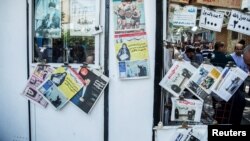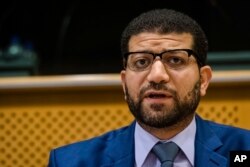An international media rights group says European powers seeking to preserve the Iran nuclear deal should use their talks with Tehran to press for an end to its harassment of journalists.
In a report published Thursday, the New York-based Committee to Protect Journalists said the current international focus on Iran's economic ties with Europe "could represent an opening to engage on press freedom."
European diplomats have held talks with Iranian officials in recent weeks to try to preserve the 2015 nuclear deal between Iran and six world powers. The United States withdrew from the deal on May 8, calling it defective and prompting Iran to say it was assessing whether the deal remained in its national interest.
CPJ Middle East and North Africa program coordinator Sherif Mansour said those engaged in negotiations with Iran should make media rights a priority.
"[Iranian] President [Hassan] Rouhani needs to be held to the press freedom commitments he made," Mansour said.
The CPJ report calls on European governments and institutions to make press freedom an "explicit and essential element of conversations with Iranian officials in bilateral and multilateral meetings."
CPJ also urged the U.S. government to ease sanctions that it says impede journalists seeking access to software for circumventing Iranian government censorship and surveillance.
On a positive note, the CPJ report said its annual December census of Iranian prisons found the number of journalists detained in Iran was just five in December 2017, the lowest mark in a decade. But the report said journalists who report criticisms of Tehran still face harassment and intimidation.
A statement issued by EU foreign policy chief Federica Mogherini in January in response to a surge in anti-government protests in Iran said human rights "always have been a core issue" in the EU relationship with Iran. She said peaceful demonstration and freedom of expression are "fundamental rights that apply to every country, and Iran is no exception."
U.S. State Department spokeswoman Heather Nauert issued a statement in March expressing concern about "grave conditions" facing the press in Iran, as detailed in a report by a U.N. special rapporteur. She called on Iran to respect its obligations under the International Covenant on Civil and Political Rights to guarantee the freedom of expression, including for members of the press.
This report was produced in collaboration with VOA's Persian service.





